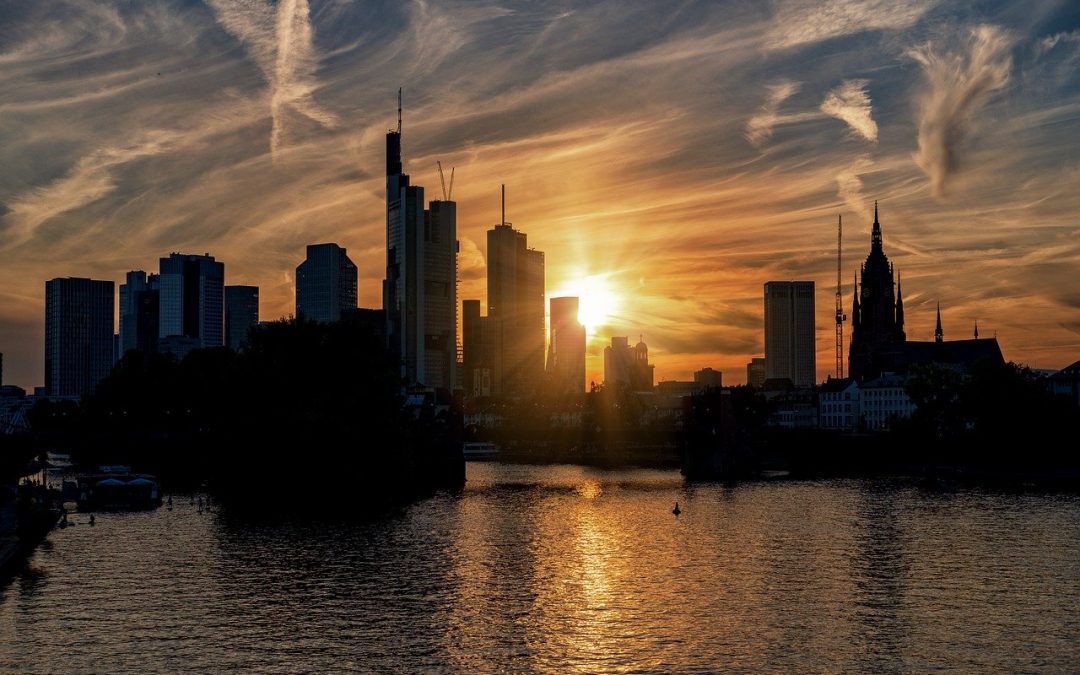
Frankfurt not only offers a fascinating mix of history and modernity, but is also the ideal place to learn German. In this blog, we’ll introduce you to 16 well-known and lesser-known, but definitely super interesting facts about Frankfurt. We’re excited to see what reasons convince you to come to Frankfurt. Write us in the comments!
1. Financial metropolis
Frankfurt am Main is the largest city in Hesse and one of the most important financial metropolises in Europe. As the seat of the European Central Bank (ECB), the German Bundesbank and numerous large banks, Frankfurt plays a crucial role in international finance. The city is a major center for banking, investment banking, insurance and asset management.
2. Skyscrapers
Frankfurt’s skyline is often referred to as “Mainhattan” because of its high number of skyscrapers, reminiscent of Manhattan in New York. The Commerzbank Tower is the tallest skyscraper in Frankfurt am Main. It has 56 floors and at 259 meters is even the tallest skyscraper in the European Union.
3. Frankfurt Airport
Frankfurt Airport is one of the busiest airports in the world and a major hub for international flights. It is the largest local employment center in Germany, employing about 81,000 people.
4. Frankfurt Stock Exchange
The Frankfurt Stock Exchange is one of the oldest stock exchanges in the world and is one of the largest securities exchanges in Europe. In front of the main entrance of the stock exchange are the sculptures of bull and bear. They are the symbolic animals of the stock exchange.
5. Frankfurt Book Fair
The Frankfurt Book Fair is the largest book fair in the world and attracts thousands of publishers, authors and book lovers from all over the world every year. Each year, a different country is the fair’s guest country, highlighting its culture and literature.
6. Frankfurt Old Town
Frankfurt’s Old Town, known as “Römerberg”, is a historic district with reconstructed half-timbered houses that give a charming atmosphere of times gone by. Some of the most powerful Roman-German emperors were crowned in the Römer.
7. St. Paul’s Church
Frankfurt’s Paulskirche is one of the city’s most famous landmarks. It was the meeting place of the first freely elected German National Assembly in 1848 and is considered a symbol of German democracy.
8. The Palmengarten
The Palmengarten is located in the center of Frankfurt and is one of the largest botanical gardens in Germany, covering 22 hectares. It offers a variety of exotic plants and greenhouses.
9. The Museumsufer
The Museumsufer promenade stretches along the Main River and is home to an impressive collection of museums, including the Städel Museum, the Museum of Modern Art and the German Museum of Architecture. Every August, the Museumsuferfest takes place, where visitors can enjoy concerts, exhibitions and cultural events along the museum embankment.
10. The Green Sauce
Frankfurt Green Sauce, a traditional local specialty, is made from a mixture of seven different herbs and is often served with boiled eggs and potatoes.
11. Cider
The “Ebbelwoi culture” is very present in Frankfurt. The “Ebbelwoi” is a regional cider that is enjoyed with pleasure in traditional cider pubs (Apfelweinwirtschaften). The cider is drunk from “a Gerippten”. This is a glass with a diamond pattern. The cider is poured from a Bembel. A Bembel is a gray stone jug with a blue pattern and is a symbol of Frankfurt’s cider culture.
12. Johann Wolfgang von Goethe
Johann Wolfgang von Goethe, one of the most famous German poets and writers, was born in Frankfurt am Main in 1749. His birthplace, the Goethe House, is now a museum and a popular destination for literature lovers.
13. Well-known personalities
Frankfurt has produced a number of well-known personalities. The world-famous philosopher and sociologist Theodor W. Adorno, the writer and winner of the Nobel Prize for Literature Günter Grass and the fashion icon Jil Sander are just a few examples of the creative diversity from Frankfurt.
14. Frankfurt Kitchen
The Frankfurt Kitchen, a revolutionary fitted kitchen from the 1920s, was designed by architect Margarete Schütte-Lihotzky. It is considered one of the first functional and efficient kitchens designed to meet the needs of modern households.
15. Goethe University
Frankfurt is not only a financial metropolis, but also an important center for education and science. Goethe University Frankfurt, founded in 1914, is one of the most prestigious universities in Germany and offers a wide range of study subjects.
16. “Ei Gude”
“Ei Gude” or “Guten Tag”: these two expressions are often used to say “Hello” or “Guten Tag”. “Ei Gude” is a typical form of greeting in Frankfurt and the surrounding region.
Summarizing, Frankfurt am Main is definitely worth a visit! And if you want to learn German, Frankfurt is the perfect place to do it! Come to Frankfurt and let yourself be inspired by the diversity and charm of this city!







